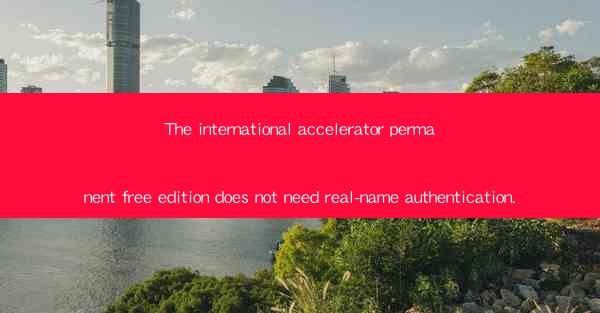The international accelerator permanent free edition does not need real-name authentication.
分类:纸飞机教程 | 发布时间:2025-03-22 01:09 | 来源:纸飞机中文下载网

The international accelerator permanent free edition is a platform designed to foster innovation and support startups around the world. One of its key features is the absence of real-name authentication, which has sparked a debate among users and experts alike. This article aims to explore the reasons behind this decision and its implications for the platform's users and the startup ecosystem.
Benefits of Real-Name Authentication
Real-name authentication has several benefits, such as enhancing security, reducing fraud, and fostering trust among users. By verifying the identity of its members, the platform can ensure that only legitimate startups and investors participate in its programs. This can lead to a more efficient and effective acceleration process, as well as a higher quality of interactions between participants.
Drawbacks of Real-Name Authentication
However, real-name authentication also has its drawbacks. For instance, it can be a barrier for startups that are still in the early stages of development and may not have the necessary legal documents to undergo the authentication process. Additionally, it can discourage investors from participating in the platform, as they may be concerned about the potential legal and financial risks associated with investing in startups without proper verification.
The International Accelerator's Approach
The international accelerator permanent free edition has chosen to forgo real-name authentication, which raises the question of how it plans to mitigate the risks associated with this decision. The platform may rely on other methods of verification, such as email confirmation or phone verification, to ensure that participants are legitimate. It may also implement strict guidelines and policies to govern the behavior of its users, thereby reducing the likelihood of fraud and other malicious activities.
Impact on Startups
The absence of real-name authentication may have a significant impact on startups that rely on the platform for funding, mentorship, and networking opportunities. While it may provide a level playing field for startups of all sizes and stages, it may also expose them to increased risks, such as fraudulent investments and intellectual property theft. Startups must weigh the potential benefits against the risks before deciding to participate in the platform.
Impact on Investors
Investors may also be concerned about the lack of real-name authentication, as it may make it more difficult to verify the legitimacy of the startups they are considering investing in. This could lead to a decrease in investor participation on the platform, which could ultimately harm the ecosystem by reducing the available funding for startups.
Long-Term Implications
The decision to forgo real-name authentication may have long-term implications for the international accelerator permanent free edition and the startup ecosystem as a whole. If the platform is successful in mitigating the risks associated with this decision, it may set a precedent for other accelerators and incubators to follow. However, if the platform fails to address these risks effectively, it could lead to a loss of credibility and trust among its users.
Conclusion
The international accelerator permanent free edition's decision to forgo real-name authentication is a bold move that has both potential benefits and drawbacks. While it may provide a more inclusive and accessible platform for startups and investors, it also introduces new risks that must be carefully managed. The platform's success will depend on its ability to implement effective verification methods and policies, as well as its commitment to fostering a safe and secure environment for its users.
相关内容推荐:
- 2025-03-22 02:11Which twitter accelerator works well?
- 2025-03-21 17:57Free accelerator on pc
- 2025-03-21 15:18Accelerator free accelerator
- 2025-03-21 19:31Mavericks Accelerator official website Download
- 2025-03-22 01:56What software does the accelerator that can always be connec
- 2025-03-21 21:22Telegeram accelerator permanent free edition
- 2025-03-21 23:41Telegram' an
- 2025-03-22 00:51Telegreat downloads the latest version.
- 2025-03-21 19:58Panda accelerator cracked version iOS
- 2025-03-21 16:34Download Android from Mavericks Accelerator app
- 推荐阅读
- 最热文章
- 随机阅读
-
- Mavericks Accelerator official website Genuine Latest Free D
- Can telegeram Gray Edition X be registered?
- Pc free accelerator in 2021
- Accelerator accelerates abroad for free without logging in.
- Quick download of vp nios version
- Paper plane telegeram official website entrance registration
- No need to log in to a free accelerator.
- Telegeram official website Download Chinese Version
- Telegreat download apple
- The difference between accelerator and ip proxy